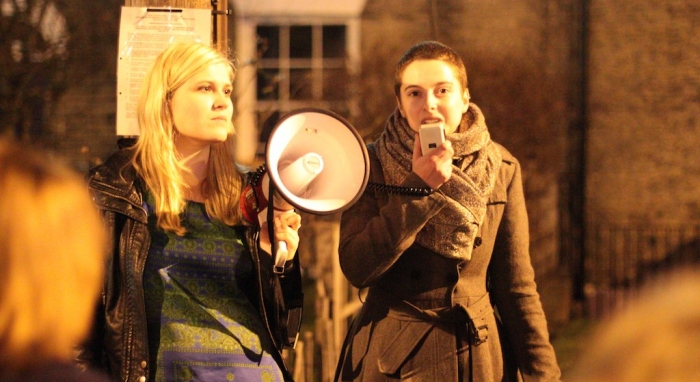Violence against transgender women is common in Mexico, mostly because employment discrimination forces many to turn to sex work for money. Santa Muerte, the skeleton folk saint with her female form and association with death, is particularly appealing to transgender sex workers, who face the persistent threat of violent clients and transphobic hatred.
Unlike official church figures such as Our Lady of Guadalupe whose images are ethereal, Santa Muerte appeals to those with practical problems and passions living on the country’s margins. Devotees ask her for protection, even when sex work is their only occupation.
“The majority of us believe in Santa Muerte,” said Betzy Ballesteros, a 26-year-old transgender sex worker. “She’s a God to us. I ask her to shield me from danger and provide work and clients.”
The cult of Santa Muerte is an example of religious syncretism, with roots in European Catholicism and Aztec beliefs.
Condemned as satanic by the Catholic Church and frequently portrayed as a narco-cult in the media, worship of Santa Muerte is nevertheless a fast-growing new religious movement in the Americas, according to Andrew Chesnut, professor of religious studies at Virginia Commonwealth University and the author of “Devoted to Death: Santa Muerte, the Skeleton Saint.”
“Mexican Catholics and evangelicals tend to view transgenderism as a lifestyle choice,” said Chesnut. “But the fact that Santa Muerte is outside the orbit of both evangelical and Catholic Christianity makes her much more appealing. It’s much easier for followers to feel that she’s not going to be judgmental.”
In contrast, many transgender women feel rejected by mainstream churches.
“I went with some transgender friends to Mass one time,” said Ballesteros. “The priest stopped his sermon and told us to leave the house of God. After that, I decided I wouldn’t ever go back.”
The Rev. Hugo Valdemar Romero, a spokesperson for the Archdiocese of Mexico City, said the church does not abandon or excommunicate transgender people. But he does believe they suffer from pathology.
“Of course it is not acceptable for someone to violate their own biology,” he said. “Nature is very clear. There are men and there are women.”
As for Santa Muerte, Romero considers it a heretical cult.
“True religion looks for the devotee to fulfill the will of God, not the other way around. If they opt for another church or belief that justifies what they’re doing, they are looking for a god made to their own measure.”
Despite the church’s condemnation, many Santa Muerte devotees describe themselves as Catholic.
The civil rights organization Transgender Europe has documented 247 killings of transgender people in Mexico between January 2008 and April 2016, the second-highest number in the world, after Brazil.
The life expectancy of transgender women in Latin America is 35, according to the Inter-American Commission on Human Rights.
“Transgender people are more likely to become involved in substance and alcohol abuse and they are less likely to have strong networks of family and others on whom they can count,” said Cymene Howe, an anthropologist who has studied the importance of Santa Muerte among transgender sex workers who migrate between Guadalajara and San Francisco.
Except as victims, transgender women are virtually invisible to the rest of Mexican society. Even the brutal murder on March 11 was relegated to the back pages of local newspapers.
Transgender activist Ari Vera Morales was expelled from a teaching training college.
“The school said I was creating a negative image,” she said. “The problem with being a transgender women in Mexico is that your identity, your existence is criminalized.”
Yet Santa Muerte plays a vital role in helping to unify a community that lacks a voice and visibility.
“When I was 14 my mum kicked me out and I went to live in the house of a friend,” Ballesteros said. “She had a big altar. I learned what a cult was, what death was, what everything was for.”

